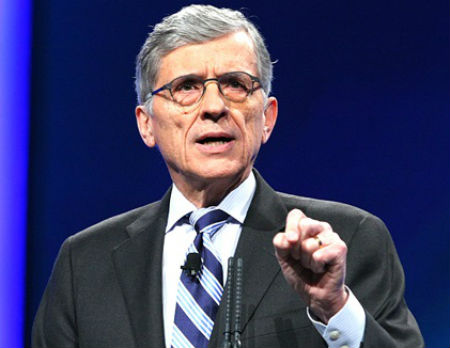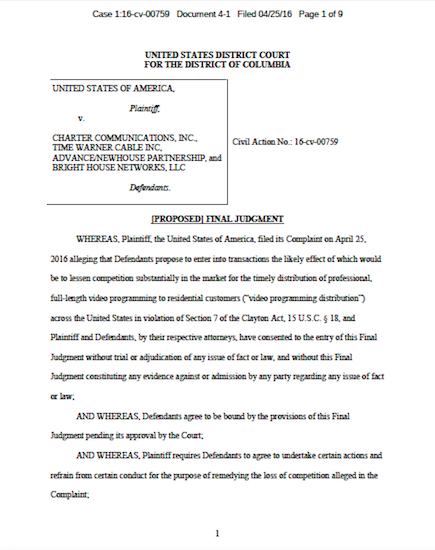Wheeler Circulates Charter-TWC Approval
The smarter way to stay on top of the multichannel video marketplace. Sign up below.
You are now subscribed
Your newsletter sign-up was successful

WASHINGTON — The Federal Communications Commission today began circulating its expected approval — with conditions — of the proposed Charter Communications-Time Warner Cable-Bright House Networks merger.
That action followed the Department of Justice’s announcement that it had allowed the deal to proceed with conditions.
The lead line on Justice's approval was that the new, post-merger Charter is forbidden "from entering into or enforcing agreements that could make it more difficult for online video distributors (OVDs) to obtain video content from programmers."
“Based on imposed conditions that will ensure a competitive video marketplace and increase broadband deployment, an order recommending that the Charter-Time Warner Cable-Bright House Networks transaction be approved has circulated to the Commissioners,” FCC chairman Tom Wheeler said in a statement. “As proposed, the order outlines a number of conditions in place for seven years that will directly benefit consumers by bringing and protecting competition to the video marketplace and increasing broadband deployment."
"If the conditions are approved by my colleagues, an additional 2 million customer locations will have access to a high-speed connection. At least 1 million of those connections will be in competition with another high-speed broadband provider in the market served, bringing innovation and new choices for consumers, and demonstrate the viability of one broadband provider overbuilding another.
“In conjunction with the Department of Justice, specific FCC conditions will focus on removing unfair barriers to video competition. First, New Charter will not be permitted to charge usage-based prices or impose data caps. Second, New Charter will be prohibited from charging interconnection fees, including to online video providers, which deliver large volumes of internet traffic to broadband customers. Additionally, the Department of Justice’s settlement with Charter both outlaws video programming terms that could harm OVDs and protects OVDs from retaliation– an outcome fully supported by the order I have circulated today. All three seven-year conditions will help consumers by benefitting OVD competition. The cumulative impact of these conditions will be to provide additional protection for new forms of video programming services offered over the Internet. Thus, we continue our close working relationship with the Department of Justice on this review.
“Importantly, we will require an independent monitor to help ensure compliance with these and other proposed conditions. These strong measures will protect consumers, expand high-speed broadband availability, and increase competition.”
The smarter way to stay on top of the multichannel video marketplace. Sign up below.
DOJ explained its focus on online distribution.
“Online video distributors offer consumers greater choices for video services,” said Principal Deputy Assistant Attorney General Renata B. Hesse, head of the antitrust division and formerly a merger advisor to the FCC “This merger would have threatened competition by increasing the merged company’s leverage to demand that programmers limit their licensing to these online providers. Together with our counterparts at the FCC, we have secured comprehensive relief and we will work together to closely monitor compliance to ensure that New Charter will not have the power to choke off this important source of disruptive competition and deny consumers the benefits of innovation and new services.”
The conditions include that New Charter will not be able to employ most-favored-nation (MFN) clauses if "they are inconsistent with this prohibition." Charter is also prohibited from retailiating against programmers for licensing to OVDs. But what constitues either could be a potential point of contention. DOJ said it would "vigorously enforce compliance with the proposed settlement to ensure that New Charter does not use the influence it will have as one of the nation’s largest MVPDs to restrict or discourage programmers from licensing their content to OVDs."
And as Charter already promised, the deal includes settlement-free peeering.
The department said it also examined whether the merger would allow New Charter to become an unavoidable gatekeeper for internet-based services, including OVDs, that rely on a broadband connection to reach consumers. Justice said that given the FCC condition that "New Charter to make interconnection available on a non-discriminatory, settlement-free basis to companies that meet basic criteria," it was satisfied and did not include that as part of the lawsuit.
The DOJ process is that it files suit against the deal, then immediately files the setllement that makes the deal OK.
DOJ outlined in its final judgment settlement what it meant by contracts that discouraged OTT competition:
"A. Defendants shall not enter into or enforce any agreement with a Video Programmer under which Defendants forbid, limit, or create incentives to limit the Video Programmer’s provision of its Video Programming to one or more OVDs.
B. Agreements that 'create incentives to limit' a Video Programmer’s provision of its Video Programming to one or more OVDs within the meaning of Section IV.A shall include, but are not limited to, the following:
1. agreements that provide for any pecuniary or non-pecuniary penalty on the Video Programmer for the provision of its Video Programming to an OVD, such as rate reductions, re-tiering or re-positioning penalties, termination rights for Defendants, or loss or waiver of any rights or benefits otherwise available to the Video Programmer; or 2. agreements that entitle Defendants to receive any benefits such as favorable rates, contract terms, or content rights offered or granted to an OVD by a Video Programmer without requiring Defendants to also accept any obligations, limitations, or conditions:
i. that are integrally related, logically linked, or directly tied to the offering or grant of such rights or benefits, and
ii. with which Defendants can reasonably comply technologically and legally. For avoidance of doubt, Defendants will be deemed able to “reasonably comply technologically” if they are able to implement an obligation, limitation, or condition in a technologically equivalent manner.
C. Notwithstanding the foregoing, nothing in this Final Judgment shall prohibit Defendants from:
1. entering into and enforcing an agreement under which Defendants discourage or prohibit a Video Programmer from making Video Programming for which Defendants pay available to consumers for free over the Internet within the first 30 days after Defendants first distribute the Video Programming to consumers;
2. entering into and enforcing an agreement under which the Video Programmer provides Video Programming exclusively to Defendants, and to no other MVPD or OVD; or
3. entering into and enforcing an agreement which requires that Defendants receive as favorable material terms as other MVPDs or OVDs, except to the extent application of other MVPDs’ or OVDs’ terms would be inconsistent with the purpose of Sections A and B of this Section IV."
""We are pleased that Chairman Wheeler has submitted the proposed conditions for consideration by the full Commission and that the DOJ has submitted its agreement for approval by the court," Charter said in a statement. "The conditions that will be imposed ensure Charter's current consumer-friendly and pro-broadband businesses practices will be maintained by New Charter. We are confident New Charter will be a leading competitor in the broadband and video markets and are optimistic that we will soon receive final approval from federal regulators as well as the California PUC."
It has been a month since the 180-day informal shot clock on the deal expired (Monday was day 211), with the FCC said to have been hammering out the conditions under which it will allow the deal.
The chairman is expected to be able to secure the votes to approve the merger, though he could get some Republican pushback — perhaps in the form of partial dissents or at least in statements — on the breadth of the asks, particularly if it smacks to them of regulating by condition. "At first blush, it appears that the Commission may have operated well outside the four corners of the merger application to pursue unrelated matters and policies," said FCC Commissioner Michael O'Rielly. "I will carefully consider the item put before me and vote in a timely manner."
A California administrative law judge earlier this month recommended that that state approve the deal, which would be the last big regulatory hurdle. The California Public Utilities Commission could vote on that recommendation as early as May 12.
Charter has said the deal will make it the third largest MVPD, serving about 17% of subs nationwide, behind Comcast at 22% and DirecTV at 20%.
In broadband, it will be the number two wireline Internet provider at 19.4 million subs versus 22 million for Comcast (AT&T is third at 16 million and Verizon fourth at 9.2 million)
The deal is certainly a way for the FCC to put conditions related to over-the-top video access, broadband buildouts and more in the name of competition and all those broadband and MVPD subs.
Charter has already promised to abide by the FCC's Open Internet order no matter what a court does, so the deal was also a way to extend that to Time Warner Cable and Bright House. New Charter has also promised to extend its policies of no usage-based pricing and settlement-free peering to the New Charter.
Click on the image below to read the full proposal.

Contributing editor John Eggerton has been an editor and/or writer on media regulation, legislation and policy for over four decades, including covering the FCC, FTC, Congress, the major media trade associations, and the federal courts. In addition to Multichannel News and Broadcasting + Cable, his work has appeared in Radio World, TV Technology, TV Fax, This Week in Consumer Electronics, Variety and the Encyclopedia Britannica.

